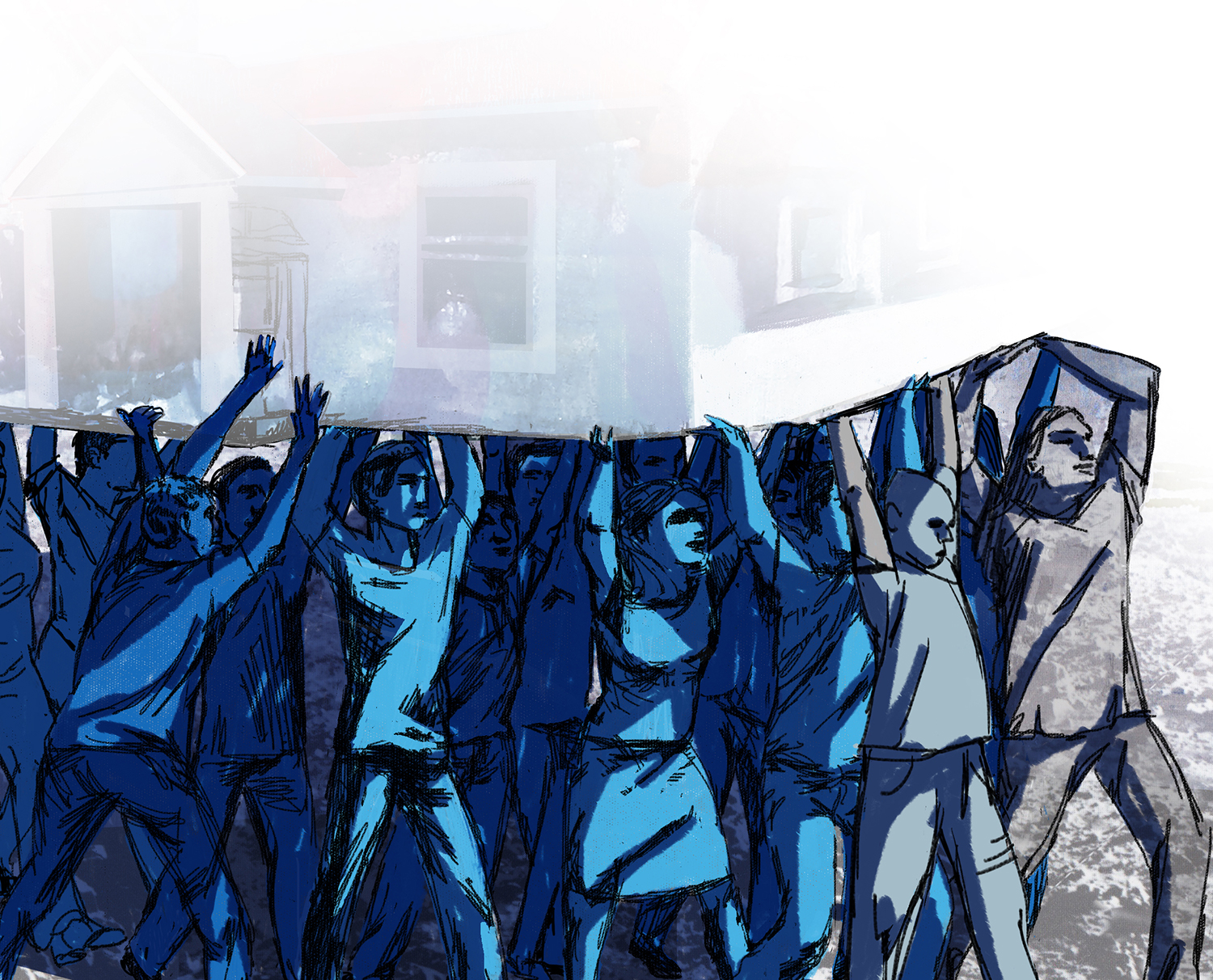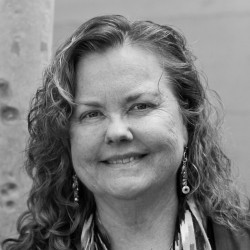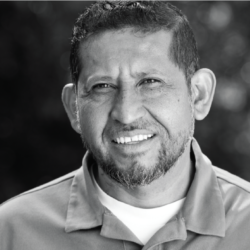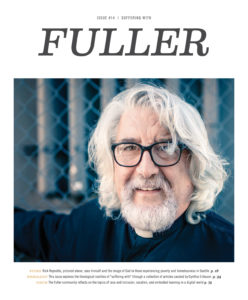
I first moved into a vibrant yet struggling immigrant neighborhood in central Los Angeles in 1988, responding to an invitation to join God in a forgotten corner of LA. The neighborhood was then only known, if at all, through media images of gangs, drugs, and violence.
The sights, sounds, and smells of this new place—taco trucks, vendors selling elote, or corn on the cob, and a courtyard where kids played together while moms laughed and chatted—drew me in. It was only as I lived here longer and began to put down roots that the stories of struggle and pain began to emerge—stories of personal and family pain, but also of the need to flee homelands where violence threatened the lives of children and adults. I had not known what to expect, and was surprised by my neighbors’ gracious welcome and, over time, the deep ways my own life and faith would be shaken and transformed through sharing life together in our neighborhood.
A few years into this journey, Roxana, one of the girls I was mentoring and who had her own life of struggle, introduced me to Chris Albisurez. Recently arrived from Central America, having fled north when he feared for his life, Chris was lost, lonely, and desperate. He wandered the streets of LA on a skateboard, writing his name on walls to find relief from the unrelenting pain in his life. “Writing on walls was my aspirin,” he said. Chris began sharing his life with me. Every week he had more stories of pain and trauma that had never been voiced. We spent hours together; Chris talked while I listened prayerfully, holding his story, the ground made holy because God was present with us and between us in the sharing.
We could not have imagined 25 years ago the deep sense of bonding and belonging we would come to share, the exquisite mutuality1 of the relationships among all of us, including my husband, John. Chris and Roxy now have three beautiful children that call me Oma. But at that time, it felt like a great risk into a deep unknown, with no certainty where the journey would lead. Recently Chris and I reflected back on those years:2
Chris: I think what I found in Jude was a person that I can trust. She would just silently sit or cry with me. When I talked, I didn’t really have a name for the trauma. It was sexual abuse, physical abuse, being independent since I was five when I lost my two younger brothers—my best friends—in an earthquake.
When I met Jude, there was a big war between gangs and graffiti writers on the streets of LA; a lot of people were dying. So it was just a critical time for me to either leave or die on the streets. And I think that I found someone that I could trust and that would listen to me. . . I remember she would say, “Do you mind if I pray for you?” at the end, and it was kind of interesting and weird for me. I never had that happen in my life. But I think I let it happen and I didn’t realize until now that it was God at work at that time in my life.
Jude: One of the things that was striking was how your posture actually changed. I remember meeting with you at a Carl’s Jr. You were waiting for me, and when I got there you were sitting erect. I had never seen you sit like that before.
Chris: Right. There’s shame. You know when pain happens to you there’s a certain amount of shame and like nobody cares. I’d carried that for almost 20 years in my life and nobody had ever said, “Let’s talk about this.”
Jude: I felt really honored that someone would share their story with me. It also felt like a risk. Chris started getting in touch with his anger, completely understandable anger. Rage, really, about the things that happened to him. I remember asking God, “Did I meet Chris just so I could visit him in prison for the rest of his life?” I was very aware that he could have been killed on the streets, or he could have done something to someone and regretted it his whole life. He had that much rage.
It was never a question for me, but an awareness l lived with. . . . Now we can look back on those years; we talk about the good times and how we have the kids, but at that time it was hard.
Chris: It was; I remember talking about that and I remember that I almost killed my father around that time. . . . because I felt that a lot of the pain that I was carrying or the trauma that I lived was caused by the absence of my father and mom in my life.
Faith in the Midst of Pain
Listening to Chris’s stories of suffering and entering into those painful places with him caused deep wrestling in my own life, as well as in his life. Chris and I reflected on the impact of suffering on our faith:
Jude: Meeting Chris led to a pretty big faith crisis. At the beginning, he was really grateful to God because God rescued him, but I would listen to Chris and go home and wrestle. I learned to pray in much deeper ways than I ever had. I grew up in an immigrant family, and we had our own issues as a Dutch immigrant family. But things had gone well for me in life for the most part. I had a fair bit of privilege in my life that I recognize now.
I had more of a resurrection theology, celebrating the new life that flows from the Resurrection, and less about Holy Week and the suffering of Good Friday. I had to grow deeper in understanding the birth of Jesus, that Jesus walked with us, he suffered for us, and then comes the power of the Resurrection. That entire narrative became much more a part of my life after I moved into the neighborhood.
Chris: At the beginning, it was like I just got to marry God and I went into the honeymoon period. But then I remember picking up a news magazine and reading about this young girl. I think she was three or four years old, in New York, and apparently her mother had put her in a closet and she died from starvation. And the article was very explicit on the things that she went through. I read it, and all of a sudden it just hit me. A lot of that stuff happened to me when I was a kid. There were times where we didn’t eat for days. I was talking to my father about 10 years ago; I asked him how he felt about my brothers’ passing and one of the things that I recall him saying is that he was an alcoholic at the time. We were hungry that evening when the earthquake happened in 1976, and both of my brothers died hungry.
I began to wonder, “Where is God in all of this?”
And so that threw me off, and I got angry at God. I was just like, “Where were you when my grandmother tried to kill me?” She was a Christian for many years and I was confused. . . . I lost my sense of love that day ’cause it was just very traumatic. I’m not going to get into the details, but it was very, very hard. And so I remember that I went and questioned a lot of things about God and the goodness of the Cross and the Resurrection, everything.
You’re given this faith, like an egg, and it crumbles in the hardship of life. You’re brought up to think one way, and then it cracks. And what do you have left? So you are in a crisis. But you know, John and Jude were patient with me, and I asked John so many questions and he just said, “I don’t have the answers for that.”
It was a struggle and it’s still a struggle of faith, but I do believe that God is good. God is a merciful God, and he is in the suffering.
I came to see that suffering, our own and others’, is the cost of love. I had moved into a neighborhood as a neighbor; we are called to love our neighbors. I came to see that the call to love your neighbor is also a call to suffer together. When we love deeply, we will suffer deeply as well. And the joys that come are also deeper.
Suffering draws us closer to God. This is the mystery of Philippians 3:10, the fellowship of sharing in the suffering of Jesus.
This fellowship of sharing in suffering goes beyond personal tragedy. When we allow ourselves to walk with others, this gives a face to larger systemic injustices that exist everywhere in our world.
Developing Personal and Communal Practices for a Lived Theology
While I was drowning in my struggle to see God and trust God’s goodness, several things sustained me. First was the community I was in, both my InnerChange team and my neighbors. I was not alone but on a journey with others. My team was gratefully a praying team, and we sought God together with and for our neighborhood. We shared life and meals together. My neighbors demonstrated for me that joy and sorrow mingle together in this world. Life is a struggle, but life is also to be celebrated, with joys shared and remembered together.
During this season, my comfort also came from the life of Mary, the mother of Jesus. I had begun to ponder the life of Mary and meditate on the Magnificat when the girls I was mentoring started asking if I believed in Mary. Before long I began to identify with Mary, who guarded many things in her heart, and whose heart had been pierced. Mary’s receptive posture and faith proclamation in the Magnificat spoke to me and became my example.
My desperation led me to a spiritual director. Sister Ann guided me toward practices that helped me live in the posture of Mary, practices that sustained and grew my trust. I learned new rhythms that formed me more deeply—that gave me eyes to see God’s presence around me and the ability to lament the sorrows I encountered. These practices became my lifeline. We in InnerChange were also deepening in our spiritual practices at this time, so this was a communal journey of going deeper with God in the midst of ministry.
Through developing deeper formation practices, I came to see that understanding faith and suffering “out there” was not enough. I began to see my need for increased self-awareness. What did I bring to this context? How did my own culture and social location impact what I saw, how I interpreted reality, how I felt and acted? I had moved to a social location very different from my upbringing, but what did I bring with me? What cultural expectations about life and faith did I carry? When John and I married in 1995, his differing lens as an African American continued to help me see my blind spots, reflecting to me my middle-class expectations for control over my life.
Becoming more aware of who I was and my own need for healing, I was able to better separate the trauma of others from my own pain. Being open to what I carried with me from my own history and culture also challenged my Messiah-complex thinking.3 Our theology may not allow us to say we are the Messiah, but in ministry, we can act as if we think we are. Although at times we may mediate God’s love to people through our presence, we have to be clear that we are not the saviors. And it goes the other way, too: God’s presence is mediated to us through those in our ministry context. This is the mutuality of life and ministry.
Father Gregory Boyle refers to this as his movement from “savior” to “savor.”4 We might come into ministry with some illusions of being a savior, but we learn to savor the relationships, the sharing of life together. Exquisite mutuality comes from our own willingness not only to share the pain of others, but also to enter the vulnerability of our own pain being exposed. We do not suffer alone but as part of the diverse beauty of the body of Christ.
Jude: We’ve been talking about the suffering and the hardships, but a theme in Chris’s and my relationship from the beginning has been joy. It’s not like we were looking for that to be the theme. Joy happens when you walk together and you aren’t alone, being able to share in life together, the joys and the sorrows.
Chris: And the sorrows.
Jude: Chris’s life and Chris and Roxy’s impact on my Dutch American family has been profound. They’ve been a part of our family, and then John and I have been a part of their family. So, it’s gone beyond individual relationship and into our networks.
Chris: Beyond ministry, beyond friendship; it’s turned into a family matter. My final word is an image that encourages me, from Isaiah: God brings beauty from ashes. God has taken the ashes of my life and brought healing and joy and created beauty. This is the image I hold in my heart.
ENDNOTES
-
This phrase is borrowed from Father Gregory Boyle in Barking to the Choir: The Power of Radical Kinship (New York: Simon and Schuster, 2017), 171.
-
This conversation is made up of selected sections from a recorded interview with Chris Albisurez, August 18, 2018.
-
J. Tiersma, “What Does It Mean to Be Incarnational When We Are Not the Messiah?” in God So Loves the City: Seeking a Theology for Urban Mission, ed. C. Van Engen and J. Tiersma (Eugene, OR: Wipf & Stock, 2007), 7–25.
-
“Greg Boyle: Save the World or Savor It,” Faith and Leadership, February 2016, faithandleadership.com.



